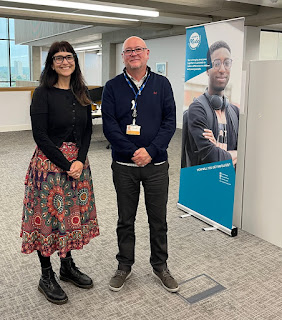A laser focus on rough sleeping
Lambeth is a young, diverse and transitory borough of around 300,000 residents, including Vauxhall, Waterloo, Clapham and Brixton. It includes some of richest parts of country and number of the poorest.
It was great to meet up with Lambeth’s head of commissioning, Paul Davis, on 19 October and hear about their extremely targeted approach in addressing rough sleeping.
While the good news is that numbers of people sleeping on the streets are not as high as other places (currently around 10 to 20 - it used to be much higher), I thought Lambeth’s experience and approach is a very good example of why it is important to maintain commitment in addressing rough sleeping and keep a consistent approach in tackling long term issues, rather than just waiting for a crisis.
To do this, Lambeth maintains a street outreach team (a team of six to seven, working seven days) and has brought in a number of key specialist roles that work with the outreach team to meet the specific needs of the people they see. These roles fill gaps and link the work of the outreach team with the rest of council.
I have often thought about the mix of roles we employ in local government and whether we can do things better. Here are some of the more specialised positions at Lambeth...
* Approved mental health professional.
Social worker or nurse with extra training to do
mental health assessments. More experience and power to section someone.
Role is employed by council to sit with
homelessness services and linked to outreach service.
This kind of work takes a lot of effort. The worker
engages personally. They get to know people individually and build relationships,
working with health teams and other partners.
In 18 months have got down from 10 entrenched rough
sleeper to four.
* Street population coordinator (rough sleeping coordinator)
Liaises with the outreach team, other parts of
council, businesses, faith groups, anyone to find out who is sleeping out and
find hidden homeless.
Role is not part of street outreach team but
regularly goes out with them.
Maintains laser focus on wider rough sleeping. Knowing
where people are from, what circumstances.
They are the eyes and ears for the council. Play a
linkage role
You need the right kind of person to do this role -
who understands homelessness and the ability and confidence to do partnership
working.
* Public protection officer
Works alongside the street outreach team, focusing
on problematic behaviour issues and anti-social behaviour.
Works directly with people who are congregating at
locations
Deliver talks at hostels about begging, sitting on
streets, drinking.
* Prison release navigator
Position employed by council, the position bridges
gaps between council, prisons and housing teams as well as other organisations
working in criminal justice area.
Good results from proactive work. In the last year,
the outreach team has seen only one person on the streets who has come out of
prison.
* Job Navigators
Work within the Council’s night shelter for people
with no recourse to public funds (mostly immigrants).
Work directly with people to understand their skills
and past work experience and help them to find employment.
*****
Coordination - 'Task and target meetings'
To assist coordination, work with multiple stakeholders is managed through
regular ‘Task and Target’ meetings, where the council gets around the table
with police, social care, day centres, outreach teams, hostel providers. Everyone
comes with names and issues.
The group discuss 35 people in a meeting. Everyone at the meeting has an idea of why someone is there, what their situation is. Understand the reason why a person not being housed. Up to people around the table to play their part.
Enforcement has failed dismally in the past and the team agrees.
Paul’s top tips for councils working to address homelessness
- Have a dedicated
resource to do this work. Don't put it on top of other
responsibilities.
- Know your
local situation. Do needs
assessment. Ask charitable organisations to help you. Really talk to
people who are rough sleeping. Find out what their issues really are. Then
you have an incontrovertible truth
- Create a coproduced
rough sleeping strategy. Get health services, business, anyone who is
affected by homelessness to cowrite it with people experiencing
homelessness. This sets up joint responsibility and then you can work
together to implement it. Have quarterly board meetings and work together.
- Remember - it's not just housing impacting people, it a whole lot of things.




There are strong parallels with Brimbank LGA - similar population numbers and profile. While in the UK councils have traditionally had responsibility for providing social housing and taken more of an interventionist role to address homelessness, in Australia councils have viewed this as the responsibility of the states. I'd argue that councils do have a role to play as enablers to bring together services that provide mental health and homelessness support along with those responsible for maintaining public order and safety.
ReplyDelete